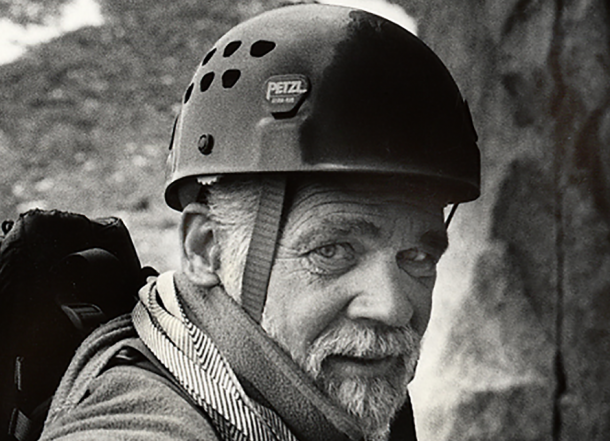Suddenly, a small-statured man with white hair and muscular forearms offered me a beer. I accepted and was quickly stunned to find out that the man was a living legend:
Doug Robinson
Doug welcomed me to the meeting and I spent the evening talking to him. I was still a young guide and had a lot to learn. The wise old guide had a lot to say and I found it to be a very enjoyable night...
Doug is an incredibly well-known and respected climber and guide. He was at the forefront of the "clean climbing" movement in the early 1970s. He pushed back against the use of rock-altering pitons in favor of equipment that didn't damage the rock. In his essay, “The Whole Natural Art of Protection,” he argued for the use of "chalks" or what we refer to now as wired nuts in lieu of pins.

As a mountain guide, there may be no one more prolific. He was the first president of the American Mountain Guides Association and has been working as a rock and alpine guide for over fifty-years...
Why do people climb mountains?
Because it gets us high.
But adrenaline junkies we are not,
and beta-endorphin isn't behind the runner's high either.
The surprising answer reveals natural psychedelic transformations
at work deep in the brains of adventure athletes.
The book is an exploration of brain chemistry through the lens of adventure sports. Doug looks at skiers and runners and climbers and delves into the complex cocktail of brain drugs that induce feelings of euphoria when climbing or the "runner's high."
There are five hormones that are released into the brain to create the feelings that we strive for in the mountains. They are noradrenaline, anandamine, serotonin, DMT, and dopamine. Each of these are released for different reasons.
Note that adrenaline was not one of the hormones on the list. Adrenaline is a "fight-or-flight" chemical. It generally comes in a rush when something very dangerous almost happens. It is not really what people strive for in their mountain sports, the idea that climbers are "adrenaline junkies" is completely false.
Doug's book delves deeply into each of the chemicals and then discusses how they interact with an athlete and make him feel. He explores these through a mix of chapters on brain chemistry and active adventure stories, bringing us on a complex journey to understand why we actually climb mountains...
The Alchemy of Action is a little dense at times. There is a lot of science packed into the book. But there is also a lot of adventure in there. And while there are a few sections that take a lot of focus for someone who isn't "science-brained" to get through, it's well worth it. Doug's anecdotes and his take on what makes us do what we do is well worth the time...
--Jason D. Martin

No comments:
Post a Comment